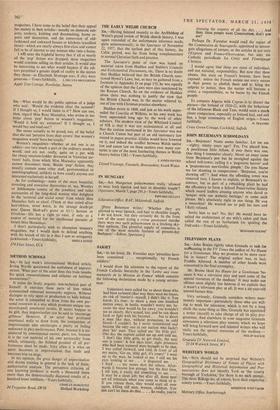THE EARLY WELSH CHURCH
SIR,—Having listened recently to the Archbishop of Wales's grand review of Welsh church history, I was again reminded of the unfortunate inference made, quite unintentionally, in the Spectator of November 22, 1957, that the earliest part of this history, the Celtic period, was far from being complementary to normal Christian faith and practice.
The Spectator's point of view was based on material taken from Haddan and Stubbs's Councils and Ecclesiastical Documents, etc. There is no doubt that Haddan believed that the British Church sanc- tioned Hywel's Laws, but, as may be gathered from a footnote to Appendix D on page 155, he was equally of the opinion that the Laws were also sanctioned by the Roman Church. So on the evidence of Haddan alone there was nothing to justify the view that the British Church was, in the matter referred to, out of line with Christian practice elsewhere.
Haddan wrote in 1868, and just as his work super- seded the Concilia of Wilkins, so his own work has been superseded long ago by the work of other scholars. The modern view of the Whitland Council of 928 is that it was not ecclesiastical at all and that the custom mentioned in the Spectator was not a Church Canon but part of an old customary law rooted in pagan practice. Gildas would have frowned on it, and indeed the conflict between Welsh native law and canon law on these matters over many cen- turies is one of the most fascinating themes in Welsh history before 1282.—Yours faithfully,
J. JONES-DAVIES
Llywel Vicarage, Trecastle, Breconshire, South Wales


































 Previous page
Previous page